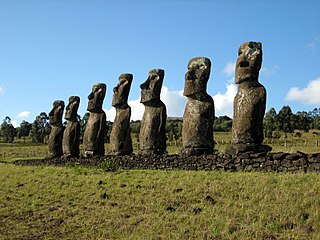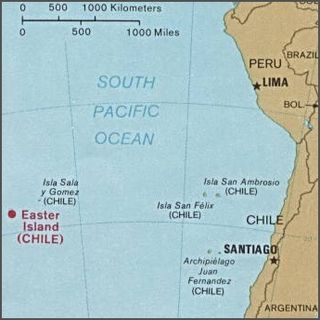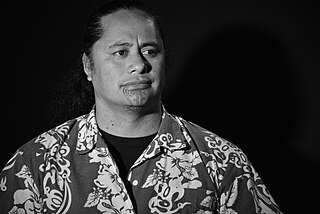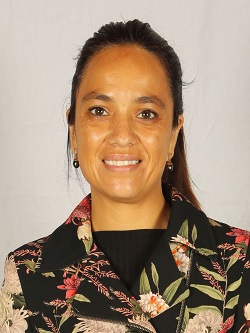
Easter Island is an island and special territory of Chile in the southeastern Pacific Ocean, at the southeasternmost point of the Polynesian Triangle in Oceania. The island is most famous for its nearly 1,000 extant monumental statues, called moai, which were created by the early Rapa Nui people. In 1995, UNESCO named Easter Island a World Heritage Site, with much of the island protected within Rapa Nui National Park.

Hanga Roa is the main town, harbour and seat of Easter Island, a municipality of Chile. It is located in the southern part of the island's west coast, in the lowlands between the extinct volcanoes of Terevaka and Rano Kau.

Rapa Nui National Park is a national park and UNESCO World Heritage Site located on Easter Island, Chile. Rapa Nui is the Polynesian name of Easter Island; its Spanish name is Isla de Pascua. The island is located in the southeastern Pacific Ocean, at the southeastern extremity of the Polynesian Triangle. The island was taken over by Chile in 1888. Its fame and World Heritage status arise from the 887 extant stone statues known by the name "moai", whose creation is attributed to the early Rapa Nui people who inhabited the island starting between 300 and 1200 AD. Much of the island has been declared as Rapa Nui National Park which, on 22 March 1996, UNESCO designated a World Heritage Site under cultural criteria (i), (iii), & (v). Rapa Nui National Park is now under the administrative control of the Ma´u Henua Polynesian Indigenous Community, which is the first autonomous institute on the island. The indigenous Rapa Nui people have regained authority over their ancestral lands and are in charge of the management, preservation and protection of their patrimony. On the first of December 2017, the ex-President Michelle Bachelet returned ancestral lands in the form of the Rapa Nui National Park to the indigenous people. For the first time in history, the revenue generated by the National Park is invested in the island and used to conserve the natural heritage.

Pedro Pablo Petero Edmunds Paoa is a Chilean politician. He serves as mayor of Rapa Nui Commune. He was previously the Governor of the Easter Island Province from March 2010 to August 2010.

Melania Carolina Hotu Hey is a Rapa Nui Chilean politician. She has served as the provincial governor of Easter Island, in Chilean Polynesia, in the first and second governments of Michelle Bachelet.

The flag of Easter Island is the flag of Easter Island, a special territory of Chile. It was first flown in public alongside the national flag on 9 May 2006.

Geologically one of the youngest inhabited territories on Earth, Easter Island, located in the mid-Pacific Ocean, was, for most of its history, one of the most isolated. Its inhabitants, the Rapa Nui, have endured famines, epidemics of disease, civil war, environmental collapse, slave raids, various colonial contacts, and have seen their population crash on more than one occasion. The ensuing cultural legacy has brought the island notoriety out of proportion to the number of its inhabitants.

Father Sebastian Englert OFM Cap., was a Capuchin Franciscan friar, Roman Catholic priest, missionary, linguist and ethnologist from Germany. He is known for his pioneering work on Easter Island, where the Father Sebastian Englert Anthropological Museum is named after him.
Carmen Cardinali Paoa is a Rapa Nui Chilean professor. She served as the governor of Easter Island in the government of president Sebastián Piñera, between 2010 and 2014.

Juan Tepano Rano ʻa Veri ʻAmo was a Rapa Nui leader of Easter Island. He served as an informant for Euro-American scholars on the culture and history of the island.

Lynn Rapu Tuki, head-teacher and founder of the Ma'aranui Cultural Academy and the Cultural Ballet Kari Kari, is an active promoter of the arts and traditions of the Rapa Nui People. He is Cultural Ambassador of Asia-Pacific and has been Head of the Liaison Office of the National Council of Culture and the Arts.
A three-part referendum on a marine reserve was held in Easter Island on 3 September 2017. Voters were asked whether they approved of the creation of a marine reserve, whether it should be jointly administered by a board of six Easter Islanders and five officials representing the national government, and whether fishing in the marine reserve should be limited to traditional methods. The proposals were the result of a November 2013 decree by the Chilean government that started the process of creating a 740,000 square kilometre marine reserve around Easter Island. All three proposals were approved by voters.
Moisés Jacob Tu‘u Hereveri was elected ‘ariki (king) of Rapa Nui from 1901 until 1902. He was the last Rapa Nui to claim the traditional kingship in the early 20th-century. However, he is not remembered as the last king instead his predecessor Riro Kāinga is generally regarded as the last king, although neither held much power. Variation of his family name included Hereveri, Here Veri, Veri-Veri, Beri-Beri, Tueri-Beri, Tueriveri, or Tueriveri.
Enrique Ika a Tuʻu Hati was elected ‘ariki (king) of Rapa Nui in 1900 and led a failed rebellion. He was one of the last Rapa Nui to claim the traditional kingship in the early 20th-century. However, he is not remembered as the last king instead his predecessor Riro Kāinga is generally regarded as the last king, although neither held much power.

The worldwide pandemic of coronavirus disease 2019 caused by severe acute respiratory syndrome coronavirus 2 severely affected Chile. The virus was confirmed to have reached Chile on 3 March 2020. Initial cases had been imported from Southeast Asia and Europe, and expanded into a large number of untraceable infections, placing the country within phase 4 of the pandemic as defined by the World Health Organization, with over 1,000 confirmed cases by 25 March 2020.
Events from 2020 in Easter Island.

Tiare Maeva Carolina Aguilera Hey is a Rapa Nui attorney and politician. In 2021, she was elected to represent the Rapa Nui people in the Chilean Constitutional Convention.
A referendum on reopening for tourism was held in Easter Island on 24 October 2021. Despite the importance of tourism to the island's economy, the proposal was rejected by 66% of voters. Voter turnout was around 20%.












